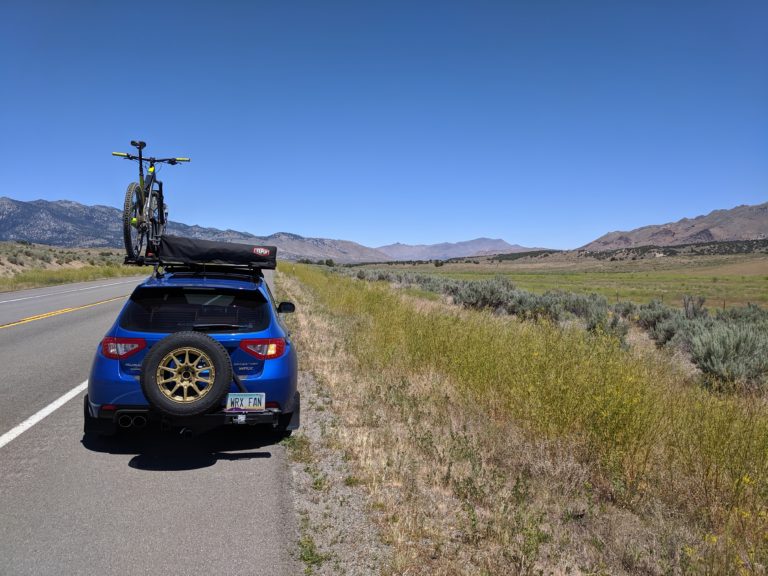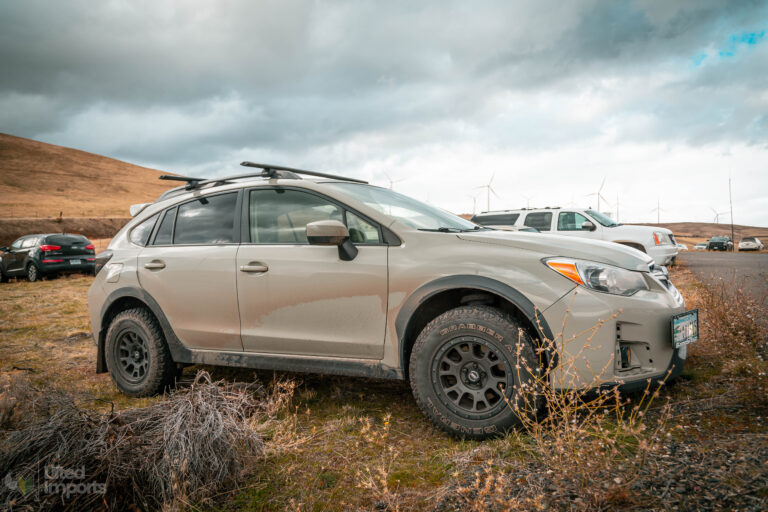
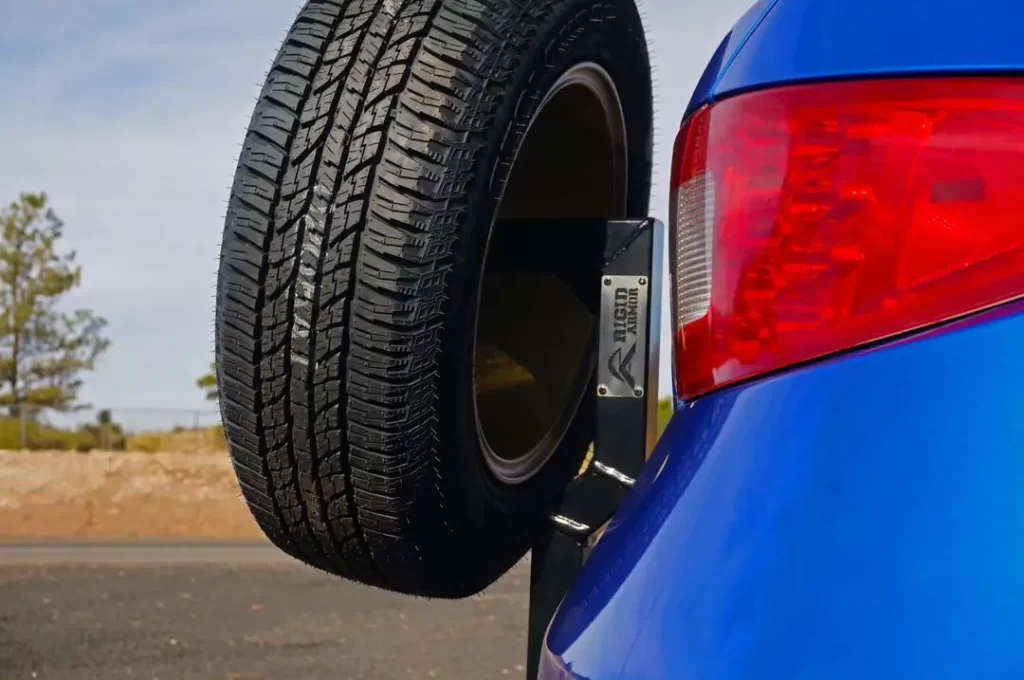
All-Terrain Tires On Your Subaru: Everything You Need To Know Before Buying
By Ben Boxer
Lifted Subaru owners, possibly more than most, understand the importance of capable tires. All-terrain tires can certainly be installed on a Subaru and give it a lot of offroad capability despite not having a low range transfer case.
But all-terrain tires might not be the best choice for you. We’ll go over all the benefits and some of the side effects you might experience after installation. At the end of this article, you should have a good idea of whether or not an offroad tire is the right idea for your build.
Table of Contents
What is an all-terrain tire?
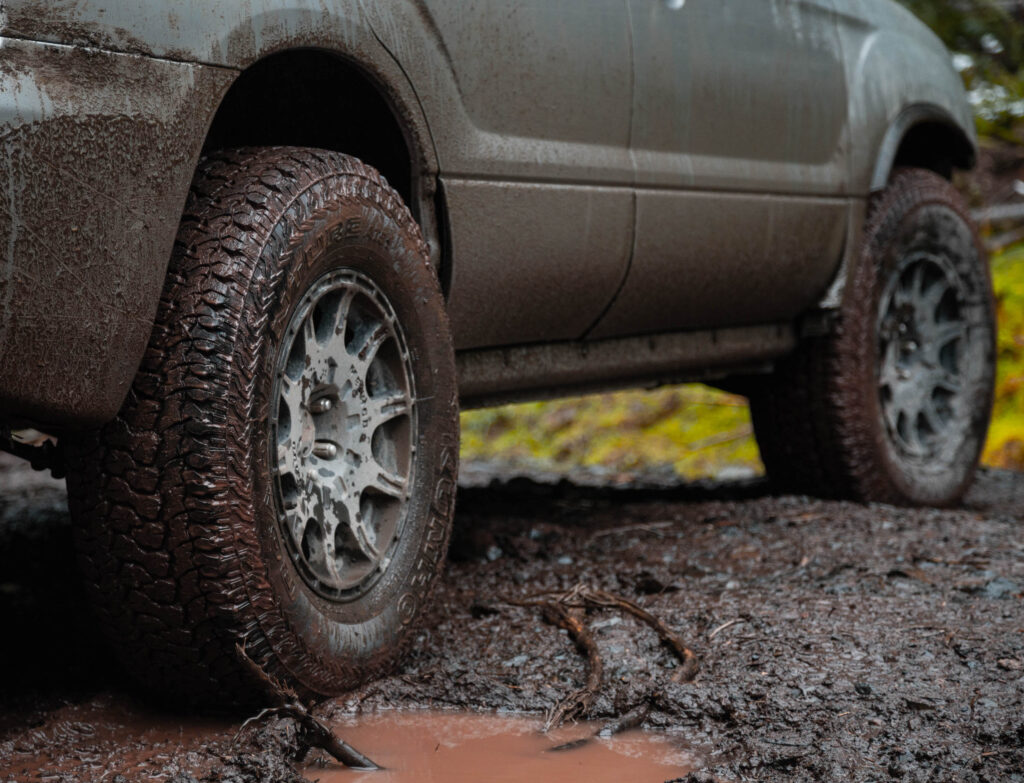
Many people may assume that AT tires are designed exclusively for off-road adventures. However, these tires are tailored for a wide range of surfaces. All-terrain tires do very well on highways and short local drives. They can also confidently handle gravel roads, and even take on some off-road landscapes with no problems.
They’re also designed to safely navigate adverse weather conditions, including light snow. But for those planning to take on serious offroading, a separate set of mud-terrain (MT) tires is might be the right choice.
All-Terrain Tire Characteristics:
- Reinforced Construction: All-terrain tires have a more robust build, featuring a stronger bead that bolsters the tire’s connection with the wheel rim.
- Durable Plies: The panels of steel or fabric mesh beneath the rubber, are tougher in all-terrain tires. This reinforcement adds strength and puncture resistance, crucial for offroading.
- Aggressive Tread: All-terrain tires come equipped with a thicker tread designed to grip better on offroad surfaces. This thickness also provides resistance to cutting, tearing, and deformation. In addition to better grip, the tread pattern of these tires efficiently evacuates water, mud, and small rocks, ensuring optimal traction.
- Versatility for Varied Surfaces: Designed for a variety of terrains, all-terrain tires offer a one size fits all solution for drivers who encounter both on-road and off-road conditions regularly.
Essentially, all-terrain tires are the perfect choice for Subaru owners wanting seamless transition between routine grocery runs and adventurous camping weekends with light offroad capability.
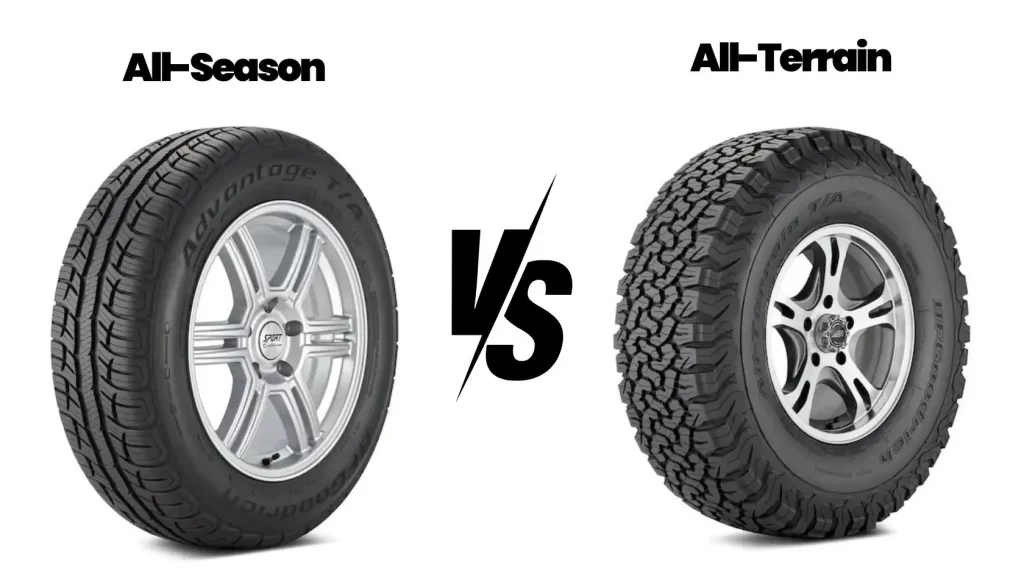
(Visually, all-terrain tires stand apart significantly with their larger tread blocks and aggressive sidewall patterns)
Opting for AT tires is a good choice that moves your car away from the pavement-only all season tires that it may have come with. The improved traction of all-terrains not only helps with traction and durability, but gives an aggressive aesthetic to your Subaru over the “boring” stock tires.
AT tires provide these benefits without significantly compromising fuel efficiency or ride comfort. However, it’s important to remember that the level of tread aggressiveness directly influences noise levels and potential effects on fuel economy.
Offroad driving frequency
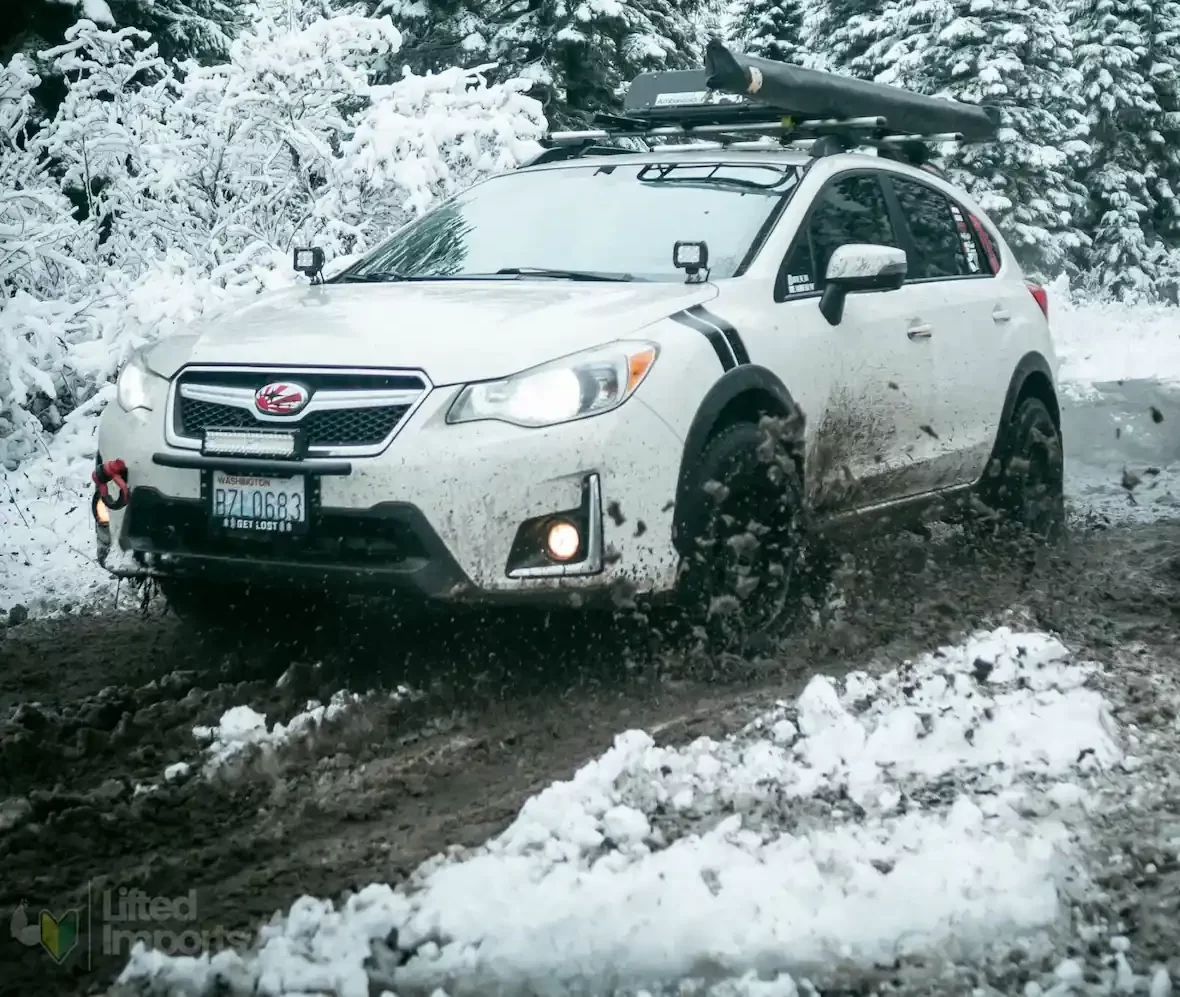
Even if you only travel offroad a couple times a year, an all-terrain tire can be the difference between having a great day and needing to get rescued by a tow truck. My opinion is that any amount of non-pavement driving more than just basic gravel roads warrants an all-terrain tire purchase.
All-terrain tires are usually intended for up to roughly 50% off-road driving in most cases. This is a bit of an arbitrary number, but it’s a good guideline for deciding if you should stick with an AT or jump to a more aggressive mud terrain tire.
Even with occasional offroad trips, all-terrain tires provide an extra layer of confidence on unpaved paths that can’t be had with all seasons. Even if you’re only planning to drive offroad 10% of the time, an AT is the best option to keep you safe when you’re in remote areas.
My Subaru Forester has been on muddy trails, gravel roads, even deep snow using all-terrain tires. I’ve since upgraded to a mud-terrain tire but I now only drive the car on trails.
Winter performance
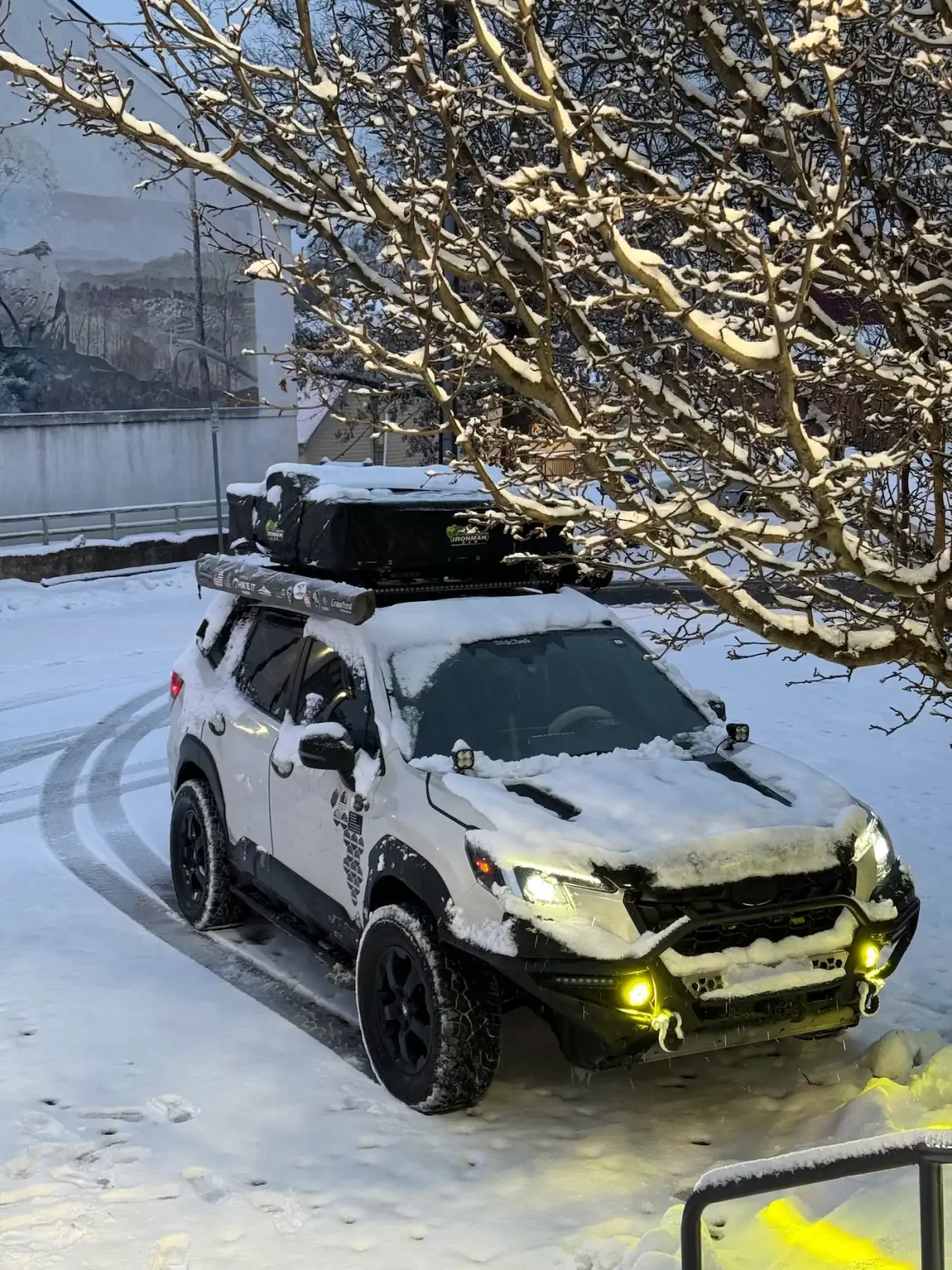
(Michael uses all-terrain tires on his lifted Forester Wilderness Edition to get around in the snow.)
While they can’t take the place of a dedicated snow tire, all-terrain tires perform significantly better than most all-season tires in snow. With deeper treads and more siping, they allow for a bit more grip.
Many all terrain tires are now “3 peak mountain snowflake” rated. This means they are formulated to remain grippy even in colder temperatures.
Ride comfort and road noise considerations
For some, the comfort and quietness of their vehicle is a big priority. While all-season tires are technically more comfortable, and often chosen for their quiet rides, advancements in all-terrain tire technology have led to reduced road noise even in aggressive options.
Ultimately, the decision needs to align with your personal preferences for comfort. But in my experience, all-terrain tires are not much louder than all-seasons; especially in modern cars that have good sound dampening. One of my Subarus has all-terrain tires on it and I’m surprised by the smooth and quiet highway rides.
I look at it this way: Yes, my offroad tires might be slightly louder. But do I want to use an all-season tire and forfeit the extra grip and durability if I find myself offroad? Personally, I don’t.
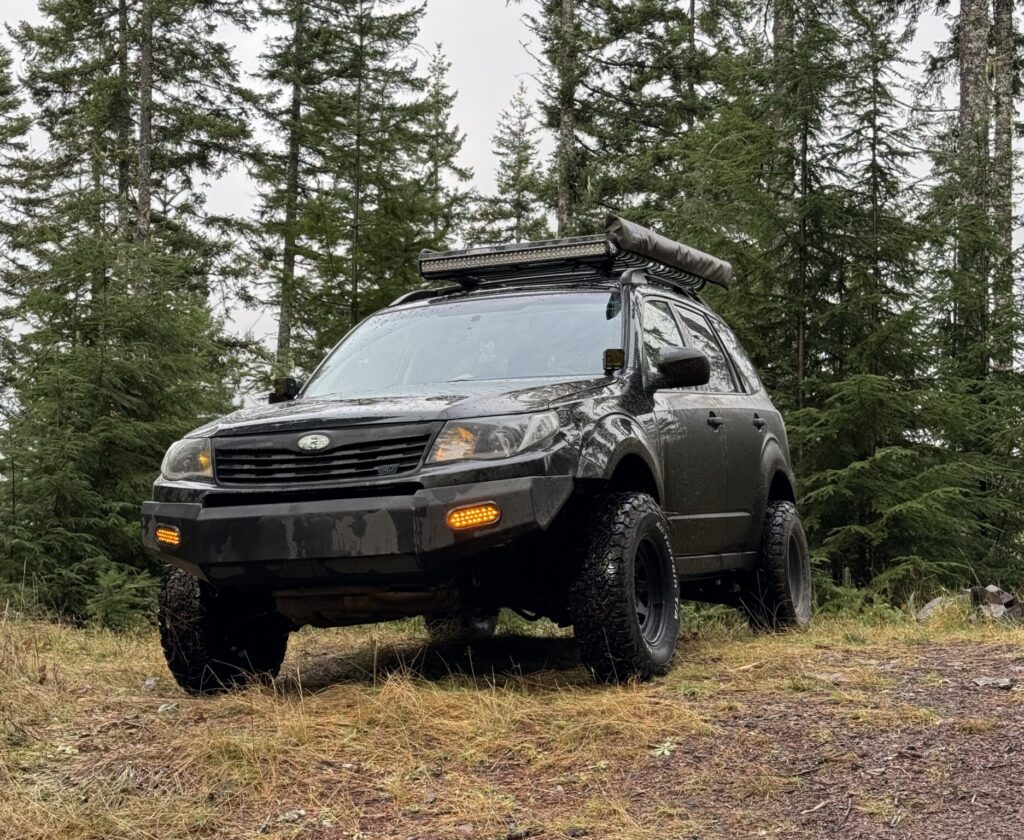
Fuel economy loss
It’s common for folks to be curious about how much a specific upgrade or modification to their Subaru will affect their pocket book. But you might be surprised how minor the difference in gas mileage might be with an all-terrain tire on your Subaru.
According to Tire Buyer, “Additional energy is required to motivate that bulky mud-terrain tread to get (and keep) rolling, and so a drop in fuel economy is almost inevitable. Test data demonstrates that a ~3% drop in fuel economy is possible when comparing all-terrain tires to all-season truck/SUV tires.”
So yes, an all-terrain tire will certainly lower your Subaru’s gas mileage. However, a ~3% loss of fuel economy isn’t enough to scare me away from the added capability. I’ve experienced a slight drop in MPG after switching to offroad tires, but it hasn’t been enough to make me go back to all-season tires.
Benefits of OEM stock tires
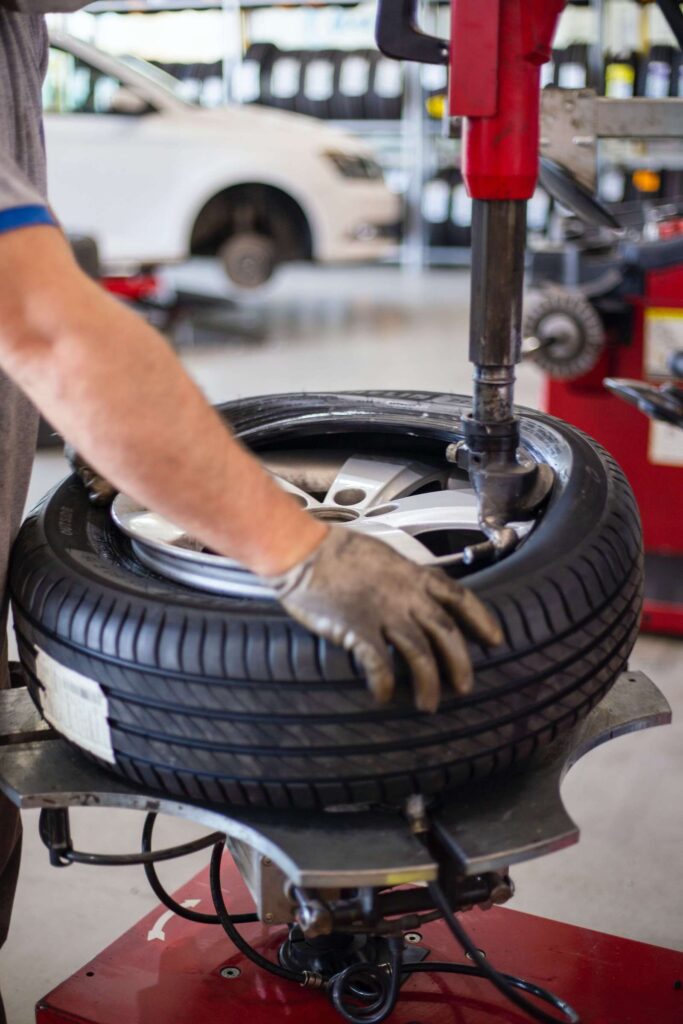
For those who want to retain the smoothest pavement driving experience and optimal fuel mileage, the stock all-season tires are the best option. But the stock tires that came on your Subaru are likely not prepared to handle even light offroad driving.
All-season tires also handle very well on the pavement when compared to offroad tires.
Are all-terrain tires right for you? Self-assessment quiz:
If you find yourself on the fence about if you should stick with your stock tires, here is a basic self-assessment that I created to help you decide whether or not making the jump to all-terrains is a good fit for you. Go through each question and choose a. or b. and if the total number of b. answers is 50% or more, then an all-terrain is definitely the right choice. Of course, the decision is ultimately yours to make. But if you hit the 50% mark or higher, give yourself permission to take the leap into a set of offroad tires! 🙂
Driving Habits:
a. I mainly stick to well-paved roads and highways.
b. I frequently explore off-road terrains or uneven surfaces.
a. Mild weather conditions are more common in my region.
b. I often encounter severe weather conditions, including heavy snow or muddy roads.
Purpose of the Vehicle:
a. My Subaru is primarily used for daily commuting and routine errands.
b. I use my Subaru for adventurous activities, such as camping or outdoor trips.
Off-Road Frequency:
a. I rarely or never engage in off-road adventures.
b. I enjoy occasional off-road trips or exploration.
Traction Priority:
a. I prioritize a smooth and quiet ride on the road.
b. I value enhanced traction and stability, especially in challenging terrains.
Fuel Efficiency Concerns:
a. Maintaining optimal fuel efficiency is a top priority for me.
b. I am willing to trade a slight decrease in fuel efficiency for enhanced off-road performance.
Comfort Preferences:
a. I prioritize a quiet and comfortable driving experience.
b. I am open to a bit more road noise if it means improved off-road capabilities.
Previous Tire Experience:
a. I am satisfied with the performance of my current tires.
b. I have faced challenges with my current tires, such as lack of traction or punctures.
Adventure Enthusiast:
a. I prefer a more conventional driving style and avoid adventurous routes.
b. I enjoy exploring diverse terrains and taking the road less traveled.
I hope this short article has been helpful as you decide whether or not you should upgrade your tires. Over the years I have found them to be the key to offroad performance and durability. If you have additional questions, feel free to email us!
Related Articles:
As an Amazon Associate we earn from qualifying purchases

